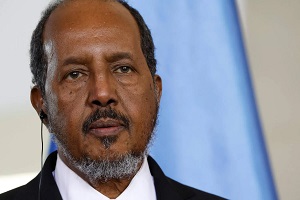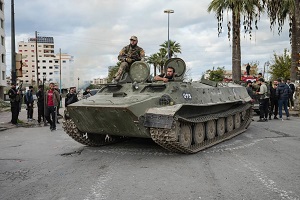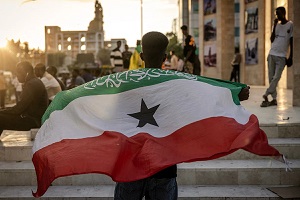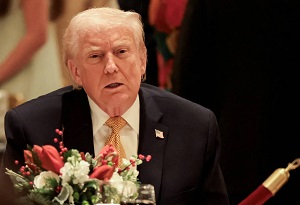Qatar suspends Gaza mediation, source says, in sign of impasse
AFP
DUBAI — Qatar has suspended its role as a key mediator for a Gaza ceasefire and hostage release deal after concluding that Hamas and Israel were unwilling to negotiate "in good faith", a diplomatic source told AFP Saturday.
The Gulf emirate, which has hosted Hamas's political leadership since 2012 with US blessing, has been involved in months of protracted diplomacy aimed at ending the war triggered by the Palestinian group's October 7 attack on Israel last year.
But the talks, also mediated by Cairo and Washington, have repeatedly hit snags since a one-week truce in November 2023 -- the only one so far -- with both sides trading blame for the impasse.
"The Qataris informed both the Israelis and Hamas that as long as there is a refusal to negotiate a deal in good faith, they cannot continue to mediate," said the diplomatic source, speaking on condition of anonymity.
"The Qataris conveyed to the US administration that they would be ready to re-engage in mediation when both sides... demonstrate a sincere willingness to return to the negotiating table," the source added.
There was no official confirmation from Qatar or any comment from Egypt and the United States.
With Gaza truce talks at a deadlock, the Hamas political office in Doha "no longer serves its purpose", said the source, without specifying whether Qatar intends to ask leaders of the Palestinian group to leave the country.
During talks over the past year, both Qatari and US officials indicated that Hamas would remain in Doha as long as its presence offered a viable channel of communication.
A senior Hamas official in Doha told AFP that "we have not received any request to leave Qatar".
'Insufficient willingness'
Despite last November's truce, when scores of Hamas-held hostages were released, successive rounds of negotiations -- as recently as late last month -- have failed to end the war.
The diplomatic source said Saturday that Qatar had "concluded that there is insufficient willingness from either side" to bridge gaps in negotiations.
A crucial hurdle has been Hamas's insistence that Israel withdraw completely from Gaza, which Israeli officials have repeatedly rejected.
On the ground in the besieged Gaza Strip, the fighting showed no signs of abating Saturday.
The territory's civil defence agency said Israeli air strikes killed at least 14 Palestinians overnight, including nine at a tent camp in the southern area of Khan Yunis.
Afaf Tafesh told AFP she had lost relatives in that strike.
"We have no food, no water, no place to sleep and we are all the time moving from place to place," she said.
Israel's military said its troops killed "dozens of terrorists" in the Jabalia area of northern Gaza, where it has been conducting a sweeping air and ground operation for more than a month.
Visiting Jabalia on Friday, Israeli army chief Herzi Halevi told troops that "we are not stopping or slowing down", vowing "to bring back the hostages, to ensure security" for Israeli communities near the Gaza border, a statement from the military said.
The conflict has expanded to Lebanon, where Israel intensified its air campaign in September and later sent in ground troops after a year of cross-border clashes with Hamas ally Hizbollah.
Hizbollah said Saturday it attacked targets in northern Israel and also downed an Israeli drone over south Lebanon.
Lebanon's health ministry reported at least 20 dead in Israeli strikes on the east of the country and 11 killed in the south, including six rescuers affiliated to Hizbollah and its ally Amal.
The ministry said earlier seven people including two children were killed in Israeli strikes on Tyre on Friday.
More than 2,700 people have been killed in Lebanon since September 23, according to ministry figures.
Iran, which backs both Hizbollah and Hamas, warned that the war could spread beyond the Middle East.
"The world should know that in case of the expansion of war... insecurity and instability can spread to other regions, even far away," Foreign Minister Abbas Araghchi said in speech aired on state TV.
Latest News
-
 Trump says 'hell to pay' if Hamas fails to disarm in short period
Trump says 'hell to pay' if Hamas fails to disarm in short period
-
 Somali President to Visit Türkiye After Israeli Recognition of Somaliland
Somali President to Visit Türkiye After Israeli Recognition of Somaliland
-
 Syrian Army Enters Latakia, Tartus after Attacks by Regime Remnants
Syrian Army Enters Latakia, Tartus after Attacks by Regime Remnants
-
 Jordan, Arab, Islamic countries reject Israel’s recognition of Somaliland
Jordan, Arab, Islamic countries reject Israel’s recognition of Somaliland
-
 Trump Says Had 'Productive' Call with Putin Ahead of Zelensky Meeting
Trump Says Had 'Productive' Call with Putin Ahead of Zelensky Meeting